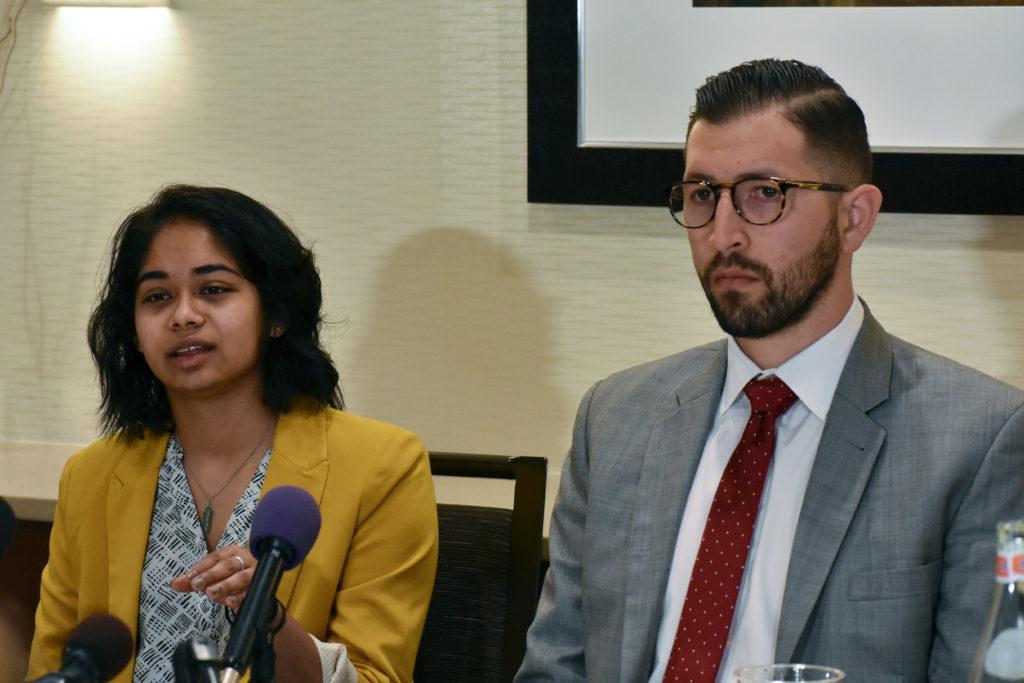Updated: Aug. 30, 2018 at 3:24 p.m.
The U.S. District Court for the District of Columbia granted the University’s motion to dismiss a suit claiming GW created a “hostile culture” for sexual assault survivors and remained “indifferent” to reports of assault.
In an opinion filed Tuesday, Judge Trevor McFadden said alumna and sexual assault survivor Aniqa Raihan did not provide enough information to show that the University “intentionally violated” Title IX policies, as she claimed in a 15-page lawsuit filed against GW in April. The judge ruled that there is no credible claim that officials intended to give Raihan’s alleged assailant an unfair punishment – a charge that led to a slew of high-profile petitions and protests on campus last year.
“There is still no credible allegation that the University intended to create impunity for sexual harassment or assault,” the opinion states. “Ms. Raihan has only plausibly alleged negligence, not intent.”
Raihan launched an online petition urging the University to expel her alleged assailant, Mark Favorito, in 2017 after he received a deferred suspension after being found guilty of sexual misconduct by the University – a lesser sanction than recommended by the student code of conduct.
In the lawsuit, Raihan alleged that the University remained “indifferent” when she reported her sexual violence case to the Title IX office in 2016. She claimed the University also continually put her at risk of sexual violence by declining to expel her alleged assailant and issue him a no-contact order.
But McFadden said that a school is only found liable under Title IX for peer harassment if the school acts with “deliberate indifference” in a way that is so “severe, pervasive and objectively offensive” that it prevents the survivor from having access to an educational “opportunity or benefit.”
Raihan said in the April suit that the University’s failure to remove her alleged assailant from his managerial position at the Lerner Health and Wellness Center forced her to avoid the building, which she said contributed to “educational harm” – preventing her from having safe and equal access to educational tools and facilities.
But McFadden said in the opinion that the years between the initial incident, which occurred during Raihan’s freshman year in 2014, and her single encounter at the gym were “apparently uneventful,” so her “self-imposed exile” from the gym didn’t deny her equal access to GW’s resources.
“The Court does not downplay the impact that seeing Mr. Favorito may have had on Ms. Raihan,” the opinion states. “Even so, this complaint does not plausibly allege that the University’s failures caused Ms. Raihan to experience ‘severe, pervasive, and objectively offensive’ harassment.”
Raihan and the lawyer representing her did not immediately return a request to comment.
“There is no justice,” Raihan wrote in a Facebook post Wednesday evening.
Raihan also filed a federal Title IX complaint last fall echoing the allegations that her sexual violence case was mishandled by the University. The complaint hasn’t launched a federal investigation.
The University reached a mutual agreement with the Office for Civil Rights last month after a nearly yearlong probe into GW’s handling of sexual misconduct cases, which was unrelated to Raihan’s allegations.
University spokeswoman Maralee Csellar said the University takes issues of sexual misconduct and its responsibilities under Title IX “very seriously.”
“The university is committed to fully supporting survivors, providing an equitable process for those who are accused and treating appropriately those who are found responsible for engaging in sexual misconduct or sexual violence,” Csellar said in an email.
Editor’s note: This post was updated to include comment from a University spokeswoman.





